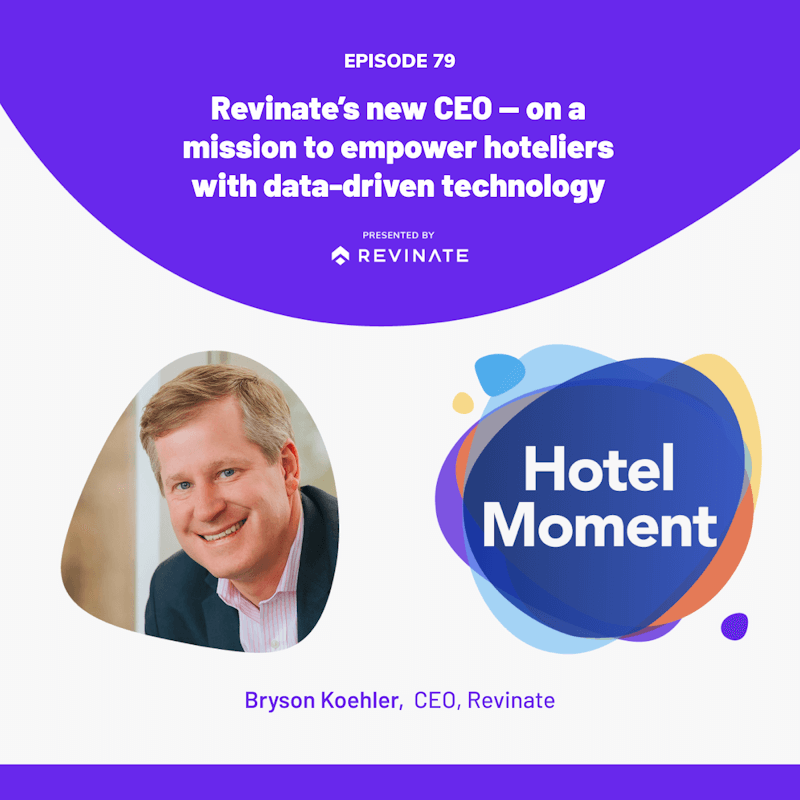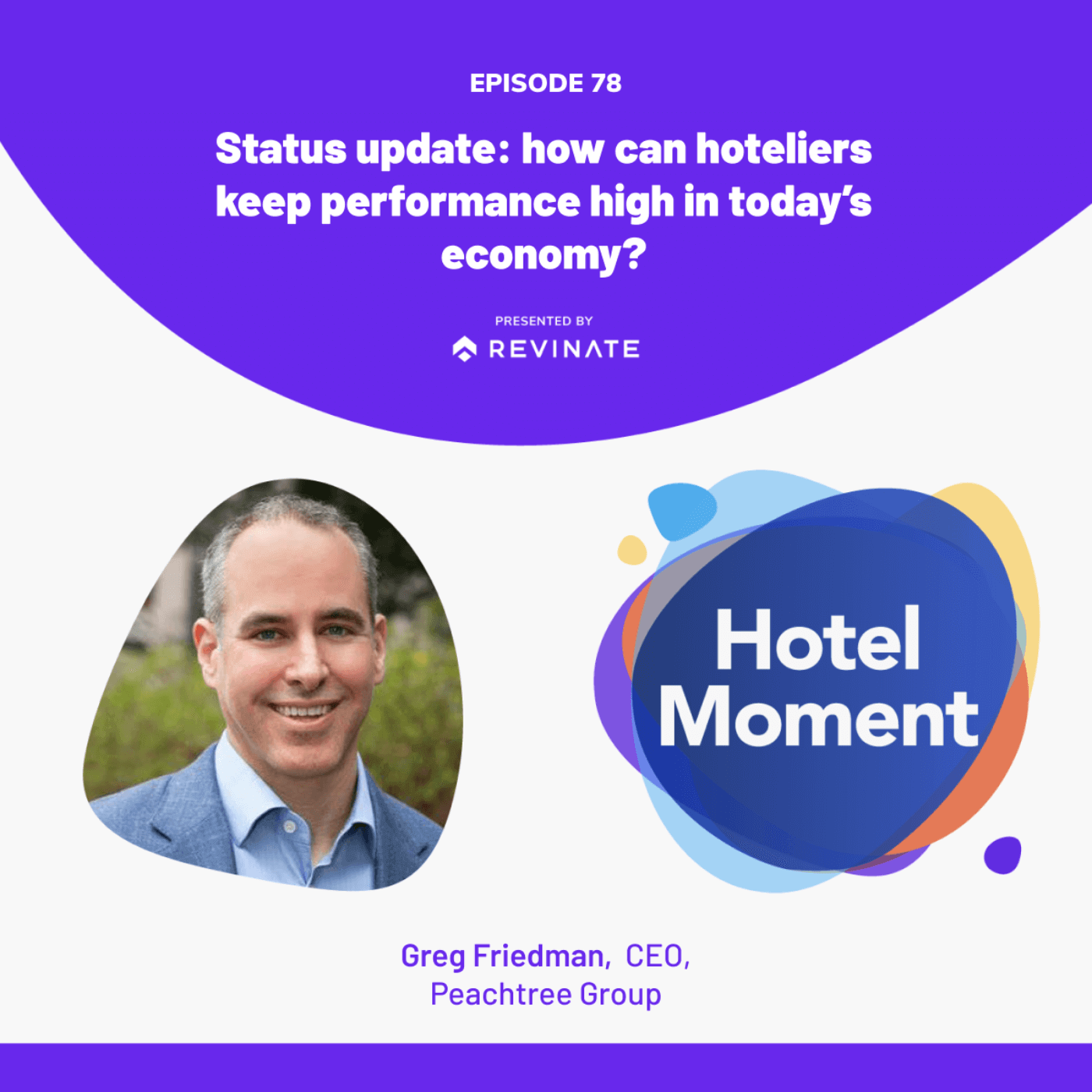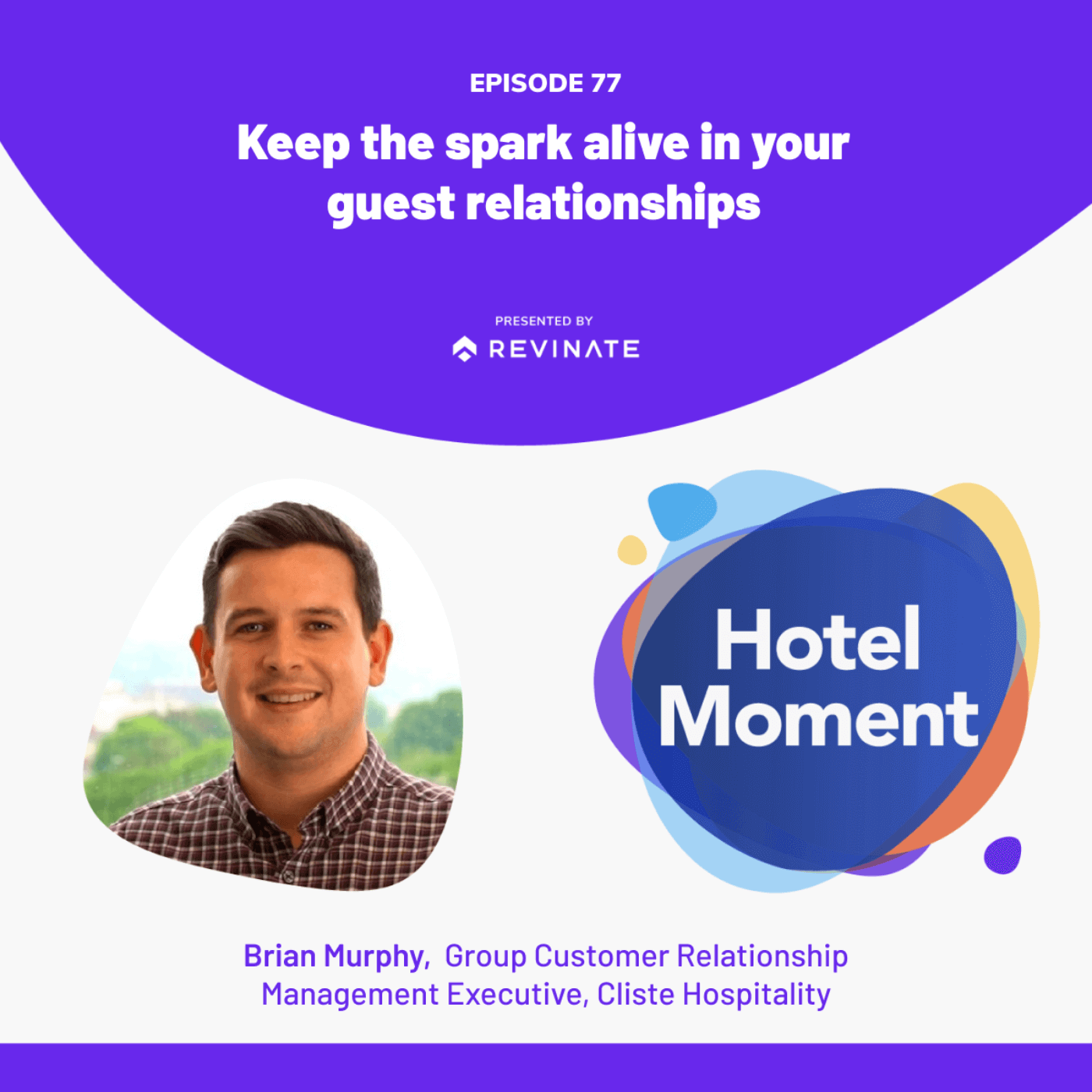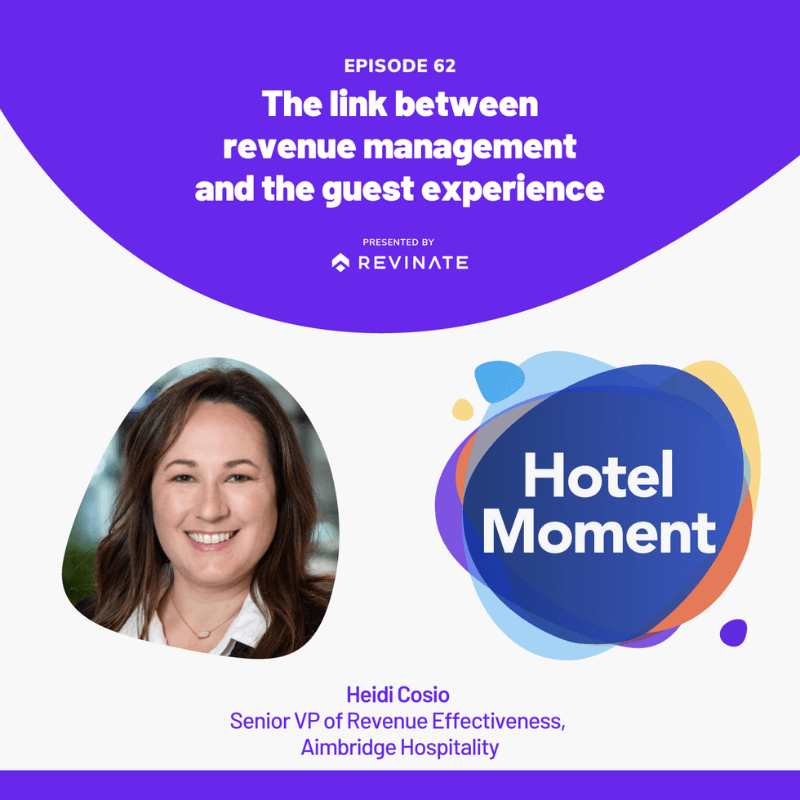

The Hotel Moment podcast — episode 62
The link between revenue management and the guest experience
In this week’s episode of the Hotel Moment podcast, Karen Stephens, Revinate CRO, and Heidi Cosio, Senior Vice President of Revenue Effectiveness at Aimbridge Hospitality, explore how hoteliers can analyze trends in their revenue performance to craft an effective selling strategy. They also examine how to encourage guest loyalty by deploying personalized upsells and making stay improvements based on guest reviews.
Tune in to find out how to market your hotel offerings to maximize profitability and wow guests.

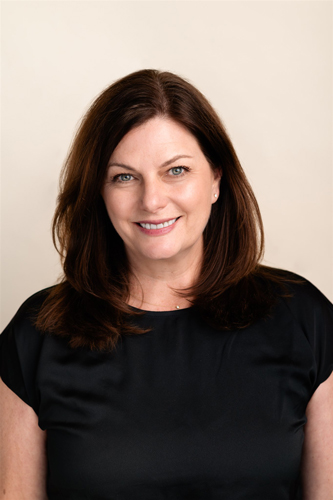
Meet your host
Karen Stephens is Revinate’s Chief Marketing Officer and runs the sales, marketing, and customer success teams. She has more than 20 years of experience in the industry alone.
On the Hotel Moment podcast, Karen speaks with leaders to draw out their experiences and insights. She is also a Francophile and Prof K — a coach, a mentor, a guide to the people who work with her.
Now Playing
Media
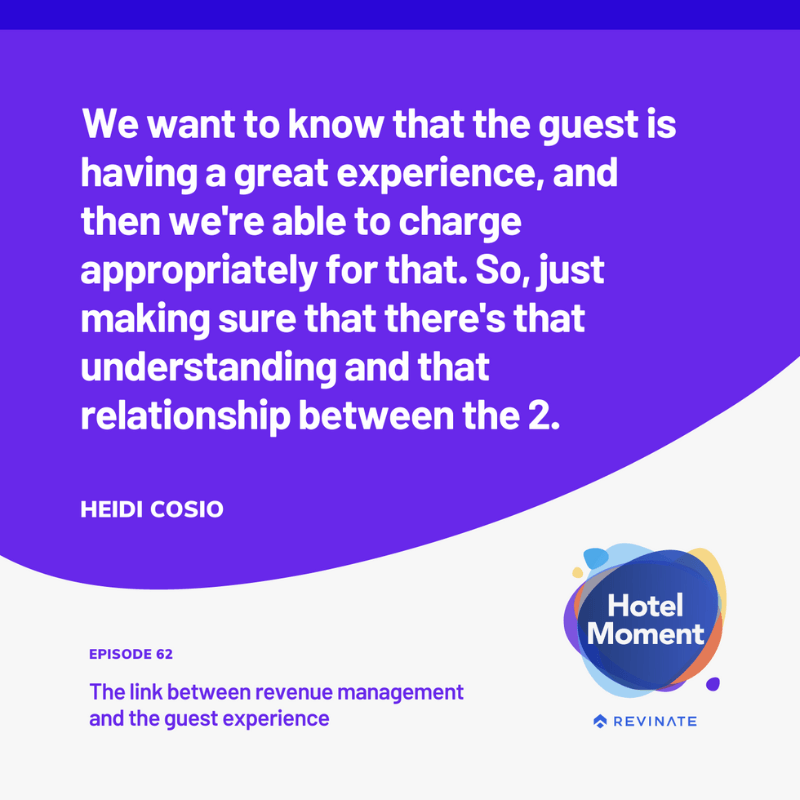
Maximize revenue and delight guests at the same time
Creating building blocks to drive ancillary revenue
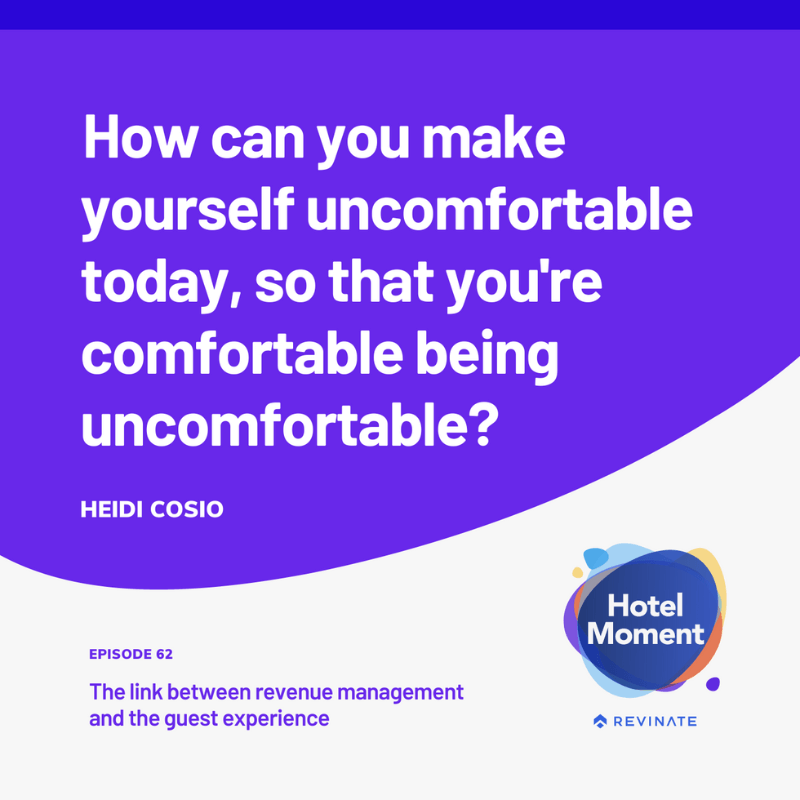
To grow, practice being uncomfortable
Connecting revenue management and the guest experience
Transcript
Karen Stephens: Hello and welcome everyone to the Hotel Moment podcast. I am your host, Karen Stephens, the Chief Revenue Officer of Revinate. And today, I am delighted to be joined by Heidi Cosio, who is the Vice President of Revenue Effectiveness at Ambridge Hospitality. Welcome, Heidi.
Heidi Cosio: Hi. Thanks, Karen. It’s great to be here today.
Karen Stephens: You know what? I am so excited to have you here.
You know, it’s like we — I was just saying before we started recording, I have the pleasure of interviewing a lot of heavy hitters in the industry, and to have somebody with your background, I mean, Aimbridge Hospitality is the world’s largest, in case our listener’s not aware, the world’s largest third-party management company. Uh, 1500 hotels. Is that right? Right around there.
Heidi Cosio: North of there. Yes. Right around there. Globally, 1500.
Karen Stephens: Globally 1500 hotels. So to be a Vice President of an organization, and you’ve also moved your way up through that organization for over 16 years now, uh, within the company, is that right?
Heidi Cosio: That is correct. Yeah, I started right as like one of the original Revenue Managers on the team, and just kind of, you know, paved my path from there.
Karen Stephens: Wow. And it’s grown so much as formerly Interstate Hotels. And then, it’s just really over the last, I mean, kind of talk to us just a little bit about the trajectory, and then we’re gonna get into the heart of the podcast. But, it’s really such an amazing story of growth there.
Heidi Cosio: Um, are you looking at Aimbridge’s trajectory?
Karen Stephens: Yeah, that’s right.
Heidi Cosio: Okay. Yeah, of course. So Ambridge started out as a, uh, pretty small company on a napkin idea between Les Bentley and Dave Johnson. Um, when I joined the company, we had 21 hotels, so still kinda small. It was one of those moments in my career where I didn’t realize how much of a risk I was taking.
Uh, at the time when you’re older, and you’ve been around the industry a little more, you kind of understand a small management company has some great benefits and some risks. Um, and it was hands down best risk that I ever took. Um, I started as the second Revenue Manager here at Aimbridge. And then, um, as the company grew, the department grew, and we were able to really define the culture of our department of what revenue management should be for Aimbridge.
Um, Aimbridge then, uh, kind of took on some good partnerships, uh, from an ownership perspective, and doubled in size every year except 2008 when we had that recession. 2009, uh, we did not lose any hotels. We actually gained one. Uh, we’ve just been doubling in size, but then after that, continued to double in size every year until essentially 2020.
And that was kind of an amazing thing to sit and watch. Yeah, and you think, “How can you be at 300 hotels and double. Oh, how can we be at 600 hotels and double? How does that happen?” And, just through some good MNAs, um, you know, smart decision-making, it really did double in size. So it’s great to kind of sit back and watch.
Karen Stephens: Well, you know what? Yeah. And I have to say, full appreciation for, you know, I — we’ve been through an MNA over here at Revinate as well, um, in 2021. And for those listeners who haven’t been through that, it’s a lot of work. And I’m sure doubling in size when you’re taking on all those hotels, and just how you operationalize that, get everybody on the same page in terms of the culture, and processes and everything else. I mean, that is admirable to double every single year. That is a lot of — a mountain of work. So, uh, kudos to you and the team because…
Heidi Cosio: It is a mountain of work, and I cannot even count now how many MNA deals, um, we’ve kind been a part of. And it’s, it’s really, it’s just a fantastic learning experience, right?
You get to onboard 100 hotels at a time, but you’re also onboarding, you know, 15 staff members just into revenue. Forget what accounting is doing, and what finance is doing in the hotels, and the GMs and, and all of that. So it’s been kind of fun to say, “Hey, welcome aboard.” And um, oftentimes we get to say “Welcome back.”
Um, it’s a small industry so if you leave Aimbridge, you’re probably gonna get acquired and come back.
Karen Stephens: You’ll be back eventually. That’s cool. Okay, well, we’ll back up now and start with my 5 questions that I ask, uh, every guest. And maybe we’ve already hit the first one, but you can let me know. So. When did you first start working the industry, and do you remember your first day on the job?
Heidi Cosio: I do. So I started working in 2000, so in summer through college, like summer internships. Uh, and I actually started with Omni Hotels right at the front desk. So a lot of that sort of operational experience, uh, really is the baseline of the first 5 years of my hospitality career.
So, uh, I started there my first day. I remember we had to wear these, uh, scarfs as part of it. So you had a formal suit, which, you know, at the age of 19 you’ve never really worn a formal suit. And it came with a skirt, and had this scarf, and there was all this debate at the front desk. “How do you really tie this?” And, “What do the different colors mean?”
And so it’s just sort of that, um, kind of a presence that you had to have at the desk working for that type of hotel company. Um, and I came with that scarf. And then I remember really that being the first opportunity I stood on my feet for 8 hours.
Karen Stephens: Oh, right.
Heidi Cosio: And knowing like, “Oh, these shoes aren’t gonna work.”
Karen Stephens: Right.
Heidi Cosio: And having to go that night and buy a different pair of shoes to make sure that I could kind of get through the entire summer. So, but I loved it. Um, it helped accelerate my learning path going back to school — really understanding that I chose the right path. Um, and then I continued on through summers, uh, with Omni and post-graduation, uh, with them as well. So it was a good experience.
Karen Stephens: Excellent. I love that. And I think, you know, it really does give you street cred for, for lack of a better word, when you come up literally through the ranks, so you really understand what happens operationally at a hotel — what it’s like to be on the front lines working with guests.
So that’s really cool. Very cool. Okay, so our second question. What is your most uplifting moment so far in your career?
Heidi Cosio: So I love this question. Um, about, uh, I would say 5 or 6 years ago, uh, I took on my first VP role, and it was because of an acquisition that we had done ,and I was kind of granted this, uh, whole team from a different perspective, right?
I had had people report to me before, but never in a leadership capacity where I’m having to lead leaders essentially. Um, and I, I had this opportunity to onboard this entire 200 hotel portfolio, teach them, you know, Aimbridge culture, Aimbridge revenue strategy, um, and then kind of onboard them to the company like that.
Um, I had an open director position, so I had, uh, the opportunity to identify somebody who could be a good fit, and wanted to make sure that I did that within the group that we took on so that we could show, “Hey, we’re here to develop you, and we wanna make sure that you have a good future within Aimbridge as well.”
So there was a, um, a woman that was within that group who, with every meeting that we had, and every opportunity that came up, she challenged the status quo. “Well, I get why you’re doing that, but — “I get that we need to do that, but why are we doing that? Why is that important? I don’t agree with that. Help me understand. Help me agree.”
And she really just reminded me of me, right? Like there was an opinion to everything. It was a strong formed opinion, and she challenged everything that I said. And I thought, “You know, she is great at developing other people too.” But she was gonna be great at developing me into what I needed, and so I immediately identified her, and promoted her into a director-level position.
She is still with us today. She has bounced around to a couple of different, really challenging portfolios and, uh, is really well-known right now for her ability to develop others, and work with our ownership groups as well. So I’m super proud of her. Um, and it was the first time that I could really identify and promote into a leadership role as opposed to just promoting from like an entry-level to an Area-Manager role. So…
Karen Stephens: I love that. I love that because I think a lot of leaders, like even when you were telling that story, I was like, “Oh my gosh, I know the kind of person you’re talking about.” You’re trying to train and then you’re like, “You are driving me bananas.”
But you actually were like, “In addition to you driving me bananas, I actually see the leadership potential in you. So I’m gonna kind of bottle that up.” And I love that. You know, instead of, you know, saying, “All right. That’s enough.” It’s like, actually promoting her through the ranks, and realizing that holding up a mirror to us, and pushing us to drive strategy is what you need.
Right. So, that’s an awesome story. I love that. Okay, the next one is a little bit more on a personal level. So what is your most striking experience so far in terms of a holiday, or a food experience, or a stay that you’ve had, uh, personally?
Heidi Cosio: I love this question. So I was blessed growing up by having a family that did a lot of travel.
Um, my dad had a bunch of personal goals he wanted to meet as far as like locations and things like that. And he was very big on, uh, never going to the same place twice because there’s too much in life to experience. And he was big on different, uh, culture aspects, and ensuring that his kids were rounded, and not just knowing locally what was available, domestically what was available, but he wanted global children, and so we did a lot of world travel.
And when I was, uh, 20, I had the opportunity to go to Tanzania. Um, so we’ve been on an African safari. And when you’re talking about like different types of experiences, it’s gonna open your eyes, um, for a lot of different reasons. Um, but most of them is really like, you’re in the middle of a just like a desert jungle scenario, right?
Um, there’s wild animals all around you. Um, there’s security for the animals, and for your own personal safety. And then you have these beautiful, all-inclusive resorts that sort of sit in the middle of all of this. So you get to experience wildlife in a way that you’ve never experienced — culture in a way that you’ve never experienced.
But the defining moment of that entire trip, which still to this day makes me laugh, and I’ve told my kids this story a million times, is, we’d stayed in a tent camp. And it was a luxury tent camp. You know, they had bathrooms. They had floors. It was, it was lovely. Um, and I asked when we went to check in, “Well, where’s my key?” And I can never, to this day, like the person’s face, they were trying not to laugh in a, like, bless-your heart type scenario. But they, they go, “It’s just a zipper, honey.” I was like, “It’s, I can’t lock my door there.” He’s like, “There’s no door to lock. It is just a zipper. It is literally a tent.” Um, and that’s just sort of this memorable experience for me. And um, next year we actually are, um, taking our children, uh, back for that same experience. And I’m just so excited to be able to share that with them as well.
Karen Stephens: That is so cool. That’s my, one of my bucket list items: this safari. You know, go to Africa, and see the animals. So that is very cool, very cool.
Heidi Cosio: It will change your life if you get a chance to do it.
Karen Stephens: I’m gonna make a chance to do it because that sounds so cool. Get myself a tent. No key.
Heidi Cosio: It’s strange. I still couldn’t say .
Karen Stephens: It’s like, this is how things work, and then you’re like, “Nope, not everywhere.” So have you met? Fourth question, have you met any celebrities while you’ve been, uh, working in hotels?
Heidi Cosio: So, of course, it’s been a long time since I’ve been actually at the hotel level, but, um, I do remember, um, combination of a couple of events working with Omni. They had here in Dallas, they had the sports contracts. So the visiting professional teams were staying at the hotel, um, but you also ended up meeting more local celebrities too.
So, um, I’ve met and checked in Jerry Jones a few times.
Karen Stephens: Okay
Heidi Cosio: Um, for those that are like old-school cowboy fans, when Emmett Smith left Dallas and went to Arizona, Arizona, traveled back to Dallas. So we got to be there and check in Emmett Smith for his first game back, uh, to Dallas. A very lovely gentleman. Met him several times. Um, but I think really for me, like, uh, when you talk about meeting somebody famous, it defines a moment in your life. I was actually working for Westin Hotels at the time, and um, this cosmetic guru came in like a big wig cosmetic guru, and I won’t mention any names, but, um, wanted to party that night, and wanted to find out a way to party, and was like, “Hey, how can you help me? Um, I wanna gamble.” And I’m like, “Well, this is Dallas. You know, you’re in Texas. We don’t allow gambling, but you can go to Oklahoma, or Shreveport, or whatever, but they’re several hours away.” And he goes, “Okay, well, get me a plane,” and put his, you know, black American Express card down. And that was the first time I’d ever seen really one of those. And I was like, “Um, I don’t. How, where do we go? How do we get a plane? How do we get a plane within an hour? Like, is this is even a thing?” And um, so that was a new experience in my life to, you know, call around, “Uh, hey, I need a private jet. How much does that cost?” It’s like $35,000. “No problem. Here’s the card number.” Right? Um, and off they went to Shreveport for the evening in a private jet. And so it’s kind of a defining experience of, yes. The answer’s always, “Yes, we can.” I don’t ever really know how I’m gonna do that. Um, and it’s, and I say defining because in the role that I’m in now, everything that I do is something I’ve never done before.
So it really kind of helps to lean back on those moments — “Well shoot, you managed to rent a private jet for somebody in a matter of 2 hours, you can put together this new report that somebody’s looking for. It’s not a problem.”
Karen Stephens: Um, Amen. I love that. Yeah. Super interesting. That is so cool. That’s so cool.
Okay, last question. I have a feeling this will be difficult for you, cuz I bet a lot of people come to mind, but who are the women at work you have been most inspired by?
Heidi Cosio: I love this question. Um, and within Aimbridge we’ve worked really hard to establish an employee resource group for women. Uh, and I sit on that, um, sort of executive, uh, committee essentially, for what, um, what we call AWE, which is Aimbridge Women Excelling.
So I get to work with a fantastic group of women trying to use their volunteer time at work to excel and push women at Aimbridge even further. And we are very female diverse company. About 55 to 60% female-led globally out of our 55,000 employees. So, um, we try to touch not just corporate office, but also those field-based members as well. So There are a couple of women within that initial group that, um, I get to work with on a daily basis that really help inspire change.
And, uh, one of them is well known within the hospitality industry and technology. Keryn McNamara, um, and she leads our group, so I’m not sure if you’ve heard her name before, but she is the head of AWE right now, the executive, uh, chairman, chairwoman. Um, and some of the things that you can just learn from her are like, she’s very, um, methodical in her thinking and speaking. So she wants to make sure that once we’ve met the meeting, that we’ve stayed on track. So she’s very good at bringing you back to center, and making sure you stayed on track, and then setting actual dates, and times, and plans, so things that move forward. And she wanted to make sure that, when we launched AWE, back in March, that it really, um, made a bang.
Like it was, “Hey, this is big. It’s important to us. It’s gonna stick. We’re gonna do something every single month.” So she makes sure that, “Hey, is there something on the calendar every single month? Does it make sense? Is it within our budget parameters? How can it be a big bang?” And, um, I just really have, uh, enjoyed working with her and learning from her.
And then there is a, um, kind of a um, not necessarily a co-chair, but another woman that, um, uh, has, is newer to Aimbridge, and she’s in charge of our corporate, uh, philanthropy and, uh, community support, Emily Gerstner. And, uh, she’s just been a joy to work with too. She came to us from, um, American Heart, and she’s kind of taught you how to, um, in a way, like, I think it’s kind of a funny thing, but how to ask for support within your community, and how to give and show support within the community. And so to remember that, “Hey, we’re not just here to serve just Aimbridge and the women in Aimbridge, but we’re here to also serve the women within the community of Plano, uh, in North Texas. So she does a beautiful job making sure that we stay focused on, on those items as well.
Karen Stephens: That is great.
Heidi Cosio: That’s just my shortlist. I can keep going.
Karen Stephens: I know. I always feel bad for that question cuz people are like, “Oh my gosh, there’s so many people I need to list here.” So…
Heidi Cosio: I know, and I don’t even touch on my mother, and grandmother, and you know, the familial support. I just kind of kept it with an Aimbridge, but yeah.
Karen Stephens: Yeah, yeah. Well those are great. And that’s really cool to hear that there’s an organization within the company that focuses on that. And you know, um, and you’re also part of an industry group, uh, that helps women in hospitality. Can you talk a little bit about that group as well?
Heidi Cosio: Um, are you referring to the travel — Women’s Travel Network?
Karen Stephens: Um, yeah, that’s the one. Yeah. I’m sorry. Or is it Travel Network, Travel and Hospitality?
Heidi Cosio: Yes, yes. And they just had a, um, a big conference, uh, this week, uh, out in Nashville. I was not able to attend, but I’ve heard just beautiful things about, uh, some of the speakers, and some of the events that they hosted too. So I’m excited to kind of get the rundown on what happened and hopefully attend, uh, next year. But, uh, yeah, they meet quarterly. Um, it is great cuz it’s a little bit like mentoring. It’s women across all hospitality networks. So it’s not just focused on hotels. There’s like, car rentals and uh, restaurants, and cruise ships, and things like that. So you kind of get to connect with women who are powering other, um, industries related to hospitality, and how they are kind of working through some of their uh, opportunities and challenges as well. So…
Karen Stephens: Very cool. All right, we’ll be sure to link that in the show notes just in case anybody wants to take a look. All right, well thank you for that Heidi. Okay, so I have a few questions for you. The first one is your title, so Vice President of Revenue Effectiveness. So we see revenue management a lot, but can you give us a little idea of effectiveness? – what that means, and, and you know, what that means in terms of your title and what you do every day?
Heidi Cosio: Of course, and I’ll throw you for a big loop because I was just promoted a couple weeks ago to a Senior Vice President, but it’s not really official until tomorrow.
Karen Stephens: Hey! Alright, SVP. We’ll make sure to update that on the outro.
Heidi Cosio: Yeah we can update the outro. So I have a really unique role. Um, my boss is, uh, Andrew Rubinacci. Uh, who is very well known, uh, in the industry.
Karen Stephens: Yep, very well known. I know Andrew from IHG, so shout out Andrew.
Heidi Cosio: Yes, exactly. And he’s been phenomenal in helping kind of support our department. Uh, when he joined us 2 years ago, he said, “Hey, if, uh, Aimbridge is gonna grow and be like a brand, which is how we want to position ourselves, um, we need a little more support and diversity within our department to be able to help support that.”
And by diversity he means, we have several VPs and we’re all doing exactly the same thing. Um, it kind of columns up. We’re doing the same thing as the RVP, as the RDR, as the ADR. Like, it’s all doing the same thing. There’s nobody focused on the needs and the values of running the actual department from a corporate perspective.
Um, so he put this position in place and I, uh, shifted into the, uh, enablement or effectiveness role. So I am all corporate support. So I work on tools and technology training, and development, uh, vendor relationships, uh, contracts that we put forward. Um, any kind of like presentation or skills subsets, um, internal departmental relationships. So everything required to keep the department functioning so the other VPs can focus on hotel performance and owner relations.
Karen Stephens: Okay, great. What a cool, what a cool job. That sounds really, sounds very, first of all, a lot of, lot of moving pieces, but I love the focus there. I think that is, that is very cool.
Heidi Cosio: And you can kind of relate now when I say, “Uh, I don’t know what I’m doing every single day.” Like a new project lands and you’re like, “I don’t know what to do with this.” And you have to figure out how to kind of clean it up, organize it, move forward, um, with that, without awful lot of baseline knowledge. So it’s been a lot of fun.
Karen Stephens: Yeah. And I think, you know, you hit on that a little bit when you were talking about your experience, your experiences in the 5 questions. You know, I think, um, and I wanna say this to kind of all of our, our listeners who are early in their careers, it’s those experiences, those challenges where you really have no clue, and you learn how to push through so you can get a confidence in yourself that, “I don’t really know how I’m gonna get to the other side, but I know I can do it.”
And that, I think, is a really, a really good skill to have cuz I think particularly women, and we’re talking a lot about women today, a lot of times we’re like, “Oh, I’m not qualified. I can’t quite get there.” But actually you can, you just need to resource yourself, reach out to mentors, and figure it out. But maybe you could just talk a little bit more about that because I think it is really important. Someone in your role every day you come up against stuff you have no idea how to do, and you figure it out.
Heidi Cosio: Everyday. The biggest piece of advice I can tell people is, practice being uncomfortable. And, and I teach this to my mentees. I teach this to my employees, and my children. “How can you make yourself uncomfortable today, so that you’re comfortable being uncomfortable?”
Um, and it’s, it’s even little things in life. Um, I’m a millennial. So, I’m not a huge person to just pick up the phone and make a quick phone call and try and resolve something. I’m gonna text you — email you — wait for you to respond, you know, that kind of scenario. So I’ve been working a little bit more recently on, you know, picking up the phone call or going, going somewhere asking that question.
And you can use that at work all the time, right? Because don’t be afraid to say to your boss or to a coworker, “I don’t really know the answer to that question. I don’t know how to get there. Can you help me brainstorm some ideas?” Um, find a mentor. Like, I cannot emphasize more about finding that mentor who’s gonna help you recognize those opportunities, and push forward through them with coaching.
And if you’ve got a mentor who is not asking probing questions, try and find somebody else, right? Because, because you need somebody to not necessarily give you advice, but coach you along the way — ask you those questions so that you get to that advice — you get to that moment yourself. Um, instead of just saying, “Okay, well, that person went that way.” or “That’s exactly what I should do.” Maybe that’s not the perfect fit for you.
So kind of being able to recognize, um, those just uncomfortable moments and, and push through them, and know that you’re gonna be okay, right? Um, so one of the biggest things that I do now is, um, I’m, I guess it’s gloating a little bit, but well known for being able to fix things, right? So, um, to be given a project to say, “Okay, this is going in 12 different directions and we need to find one direction for it. And we’re gonna give it to you and run.” You know, I like to just sort of dive in. “Okay, show me everything. Put all your cards on the table, and we’ll just identify each one as we go and figure out, um, which pieces need to be corrected and which pieces are working great.” So I tend to get a lot of those projects.
Um, and I still to this day, even though I’m known for being able to do that, look at it and go, “Oh, that can wait.” Just because I don’t know where to start, you know? Like, ”Oh yeah, I’m gonna get to that tomorrow just cause I don’t know where to start.” So it’s, it’s just sort of forcing yourself into that.
Karen Stephens: I love it.
There’s an expression I like to use, which is, “the brains are in the building.” So even if you don’t know, somebody does. So figure out who that person is.
Heidi Cosio: expression. Yeah. Hey, can you steal that from you? That’s a great.
Karen Stephens: Go for it!
Heidi Cosio: The problem is sometimes you are the brain that’s in the building and you’re like, “I, yeah, I don’t know.”.
Karen Stephens: Yeah. And there’s other people who can help, so I love that. That is just, I think, great advice. Great advice. Um, okay, so, uh, you know, I think switching gears a little bit, we’ve had a really interesting run here, uh, in the hospitality industry through the pandemic, et cetera, and I read an article that you had talked a little bit about using different KPIs.
You know, traditionally when we look at revenue management, you look year on year. You’re like, “What did we do last year? What are we doing this year?” But I think with 2020, 2021, even 2022, we’ve had such a spike of like no bookings and then crazy ADRs, and back and forth. So can you talk a little bit about how you think about looking at KPIs to, to judge performance because the year on year has gotten so, for lack of a better word, funky over the last few years.
Heidi Cosio: Sure. The last, um, I would say probably 3 to 6 months, um, we’ve been really focused on trend analysis. So instead of year over year, looking more week over week by day of week, right? What did Monday do the last 12 Mondays? What has Tuesday done the last 12 Tuesdays? How are we breaking that down into, you know, occupied rooms by segment or by ADR? And really kind of making that comparison, as opposed to making the comparison month over month, or year over year. And you know, I went in this morning, just to kind of look around to see, “Hey, is there anything that’s sticking out?” We have a team call every Friday, and I’m responsible this week for company updates. Uh, “Is there anything in the last 30 days that’s, um, really come to light? Or the last 90 days that has changed?” And you really do have to zero that down in, especially in June, right? Because May is a little bit different. June’s a little bit different. April was a little bit of a different beast. And so with each week kind of changing, um, you definitely have different aspects that you have to look at. So if you just stick to that trend analysis, am I doing better than I did last week, or the week before that? Um, you’ll tend to make better pricing decisions than supposed to say, “How did I do last month? As a comparison, or, or to prior year? “You know, am I getting slowly better?” Right? That’s what I wanna look at. If I’m not getting slowly better, let’s make some changes.
Karen Stephens: And what is happening? And then you dive into, “Okay, where’s it coming from? Channel mix, et cetera. Very cool.
Heidi Cosio: Exactly.
Karen Stephens: Very cool. Okay, so in revenue strategy, obviously everything is wrapped up in data, but how do you bring that back around to making decisions for the guest experience?
So that’s kind of the other piece of this, and I know you’re focused on vendors and systems, but do you think about the guest experience as well with the data?
Heidi Cosio: Uh, yeah, we do. So, um, kind of 2 different aspects to that is, one we are looking at, even in revenue management, your service scores or your, um, like online reviews. We take those to heart and it’s, uh, really about saying. “Hey, if you’re having some problems from a top line revenue perspective, the first place we’re actually gonna look is, “What are your guests saying about your hotel, and how can we help you get the hotel in order and get your reviews up so that we really can sell that?” Right? You can only have so many first time customers before you have to, you know, kind of refresh your image.
And if there is something that we can help support in that category, then we’re more than happy to to do that. Um, if it’s an instance where you can’t get your service scores up, or there’s some hurdles or struggles, we’re gonna reposition your hotel from a pricing perspective until you can focus on those matters.
So it does take a kind of a different approach. So we wanna know that the guest is having a great experience, and then we’re able to, on the flip side, charge appropriately for that. So just making sure that there’s that understanding, and that relationship between the 2. A lot of people don’t think that exists. Um, and we’re like, “Well, yeah, actually it, it’s, it’s a huge factor.” And you just think about it yourself, like, when you’re booking a hotel room yourself, and that hotel doesn’t have really great reviews, are you gonna book it? And even in the industry, when I know that reviews aren’t exactly accurate, I’m still gonna be the same way, right? No different when choosing a restaurant, or buying a new car, or something like that.
Karen Stephens: 100%.
Heidi Cosio: Yeah. And so the other, the flip side aspect to that is we’ve been focused a little more this year on, um, I would say, putting in some building blocks for ancillary revenues. So really in revenue management understanding, “What the value of spa, golf, cabanas, restaurants — what is that bringing to the table? And, uh, how do we help kind of affect some of that pricing, and that experience level for that ancillary revenue?” Which, um, has not really been tapped into, I don’t think yet. So…
Karen Stephens: Very interesting. Yeah, we, we think about that a lot here at Revinate too, which I’ll save for another time, but, um, you know, that’s all part of the picture.
“How do you get a full picture of the guests that are coming to your hotel? What they’re spending, where they’re spending it, so that you can make sure that you market to them appropriately for lack of? —” Yeah, you’re, you, you’re making sure that you’re driving back that loyalty based on what you know that they like effectively, right?
Heidi Cosio: And the data’s there. It’s just a matter of getting your hands on it, and being able to figure out trend analysis.
Karen Stephens: Fun with hospitality data. It’s all over the place.
Heidi Cosio: Don’t get me started.
Karen Stephens: Oh, that’s great. Okay, so Heidi, so to take us home, we are recording this in the beginning of summer, uh, get, you know, what is your crystal ball predictions kind of for the rest of the year?
How are we feeling about, you know, is revenge travel here? Is it back? I know you have a lot of, you have a lot of hotels in a lot of places, so are there any kind of insights that you can give our listeners on what you’re seeing trend-wise for the industry? We’ll just talk about maybe the United States to keep it a little bit more limited, but which is still huge. Uh, but what are, what are your thoughts?
Heidi Cosio: Well, so it’s a, that’s a fantastic question, right? And it’s definitely a crystal ball. So when you look at where have we really see more growth, especially in that ADR segment, which is where everyone is hyper-focused, itt’s been more heartland for us. It’s been more like, um, Minnesota, Michigan, Ohio, Oklahoma, Indiana, uh, which I think is really fascinating.
I think our coastal areas did really well in 22’. Uh, especially we have really heavy presence in Florida, California, and sort of up the East coast. Um, and those hotels, again did really well in 22’. And so without, um, a larger influx of international travel, um, going back to those markets, that’s gonna stay relatively stable.
Maybe, uh, a slight ADR increase, but we’re really seeing domestic travel exit, right? Um, and go out now that it can — and we haven’t really seen the international inbound quite as quickly yet, especially from, um, more Asian markets, China, uh, Japan, India, uh, those places yet. So still waiting for that. But, but the increase in heartland travel, which I think is really more associated around, uh, youth groups, uh, sporting events, and smart sporting events, and things like that, which has been great.
Um, our portfolio is really, we do have some grateful service assets, but we do have quite a few hand-heavy on the select service side, so that is our bread and butter, uh, for a lot of that, that particular market. So it’s good to see that that’s, uh, still running really strong. Um, what I am interested in from a summer travel perspective, you know, kind of 2 different perspectives, right?
Is, it didn’t help that at the beginning of the summer, the airlines came out, and the FAA came out and said, “We don’t have enough air traffic controllers to support and expect 40% delays.” And then New York is under fire right now, you know? And so you’re like, “How is that going to really affect you as a traveler?”
Uh, so far it hasn’t. Right? We have a banging Memorial Day and the airlines seem to pull it off just fine without any, any trouble. So I think that was a great, um, outlook to hopefully how the summer is gonna trend. Um, and then, uh, the other ones being that BT travel’s still not, still not in existence.
Um, it looks a lot different. Uh, it still continues to trend and to look a lot different. Um, it was encouraging to me actually, to see the traffic uptick here in Dallas, um, in May, and then again in June. So you can see a lot of companies have finally, getting back to work, which is even a funny thing to say in the state of Texas, you’re like, “Oh, I thought Texas has been back for like years?” “No, um, we still had some big financial institutions that hadn’t been returning to work yet that finally are getting back onto their feet.” So hopefully that’s a good outlook for Q4 and we’ll see a little bit more of that trend in a positive direction. But, um, still haven’t seen it yet like we wanted to.
Karen Stephens: Okay. All right. So a little mixed bag, but, uh, at least we’re off to, well, it seems like Memorial Day was a pretty good start and, and fingers crossed. Uh, and I —
Heidi Cosio: it’d be a good leisure summer for sure. I mean, we’ll still be on that leisure trend, I think. Um, it’s not gonna be in the same places, right? Because Florida is not doing as well as last year, but they’re still doing okay.
And, um, our Caribbean markets seem to be doing okay. Texas is doing okay. It’s just not last year. It was just like, “Oh my God.” Everybody’s like,”Last year it was that revenge travel. This year it’s sort of, it’s just travel.” It’s just who we are now.
Karen Stephens: It’s just travel. Well, and it’s good to hear the kids are getting back out, right? The sports teams are on the road, and that’s good. That’s fantastic. Yeah. All right. Great. Well, my, my, uh, guest has been Heidi Cosio, who is the Senior Vice President of Revenue Effectiveness at Aimbridge Hospitality. Congratulations on the promotion, and thanks so much for your time today.
Heidi Cosio: Thank you, Karen.
Related episodes


Be the first to know when a new episode drops
This site is protected by reCAPTCHA and the Google Privacy Policy and Terms of Service apply. *Required fields.

